Pope Francis visited the Greek island of Lesbos on Saturday, highlighting the plight of nearly 4,000 migrants, who, in the wake of the E.U.-Turkey deal, are in limbo waiting to see whether they’ll be granted asylum in Greece or be deported to Turkey.
The vatican also announced the Pope would bring 12 refugees, all of whom are Muslim, back with him to Italy. The Vatican is already hosting two refugee families.
Putting aside a schism stretching back centuries, the pontiff made the visit along with Patriarch Bartholomew, the spiritual head of the Eastern Orthodox Church in Istanbul, and Ieronymos II, head of the Greek Orthodox Church.
“This is a voyage marked by sadness,” he told reporters on the plane from Rome. “We will witness the worst humanitarian disaster since the Second World War.”
The airport of Mytilene, the main town on Lesbos, was on lockdown as the Pope’s Alitalia flight touched down just after 10 AM, bearing the flags of both Greece and the Vatican. Francis descended to the tarmac where he was greeted by Greece’s Prime Minister Alexis Tsipras, the Orthodox leaders and Spyros Galinos, the mayor of Lesbos.
“I am proud of this,” Tsipras told the Pope at a public meeting soon after his arrival. “Particularly at a time when some of our partners — even in the name of Christian Europe — were erecting walls and fences to prevent defenseless people from seeking a better life. That is why I consider that your visit is historic and important.”
The Pope’s visit highlights the ongoing nature of the migrant crisis: Just a few hours before he touched down, Frontex, the European border patrol agency, intercepted a dinghy carrying 41 Syrian and Iraqi migrants who had made the journey from Turkey. The refugees were detained and brought to shore on Mytilene.
As Francis passed through the town, the streets were lined with police, Greek navy officers and local residents who strained eagerly to catch a sight of the pontiff. “It’s an honor,” said Nellie, 47, a Lesbos local who asked TIME not to use her last name. “It draws attention to the problem and will make Europe understand that something must be done to fix the situation.”
Pope Francis Washes the Feet of Migrants
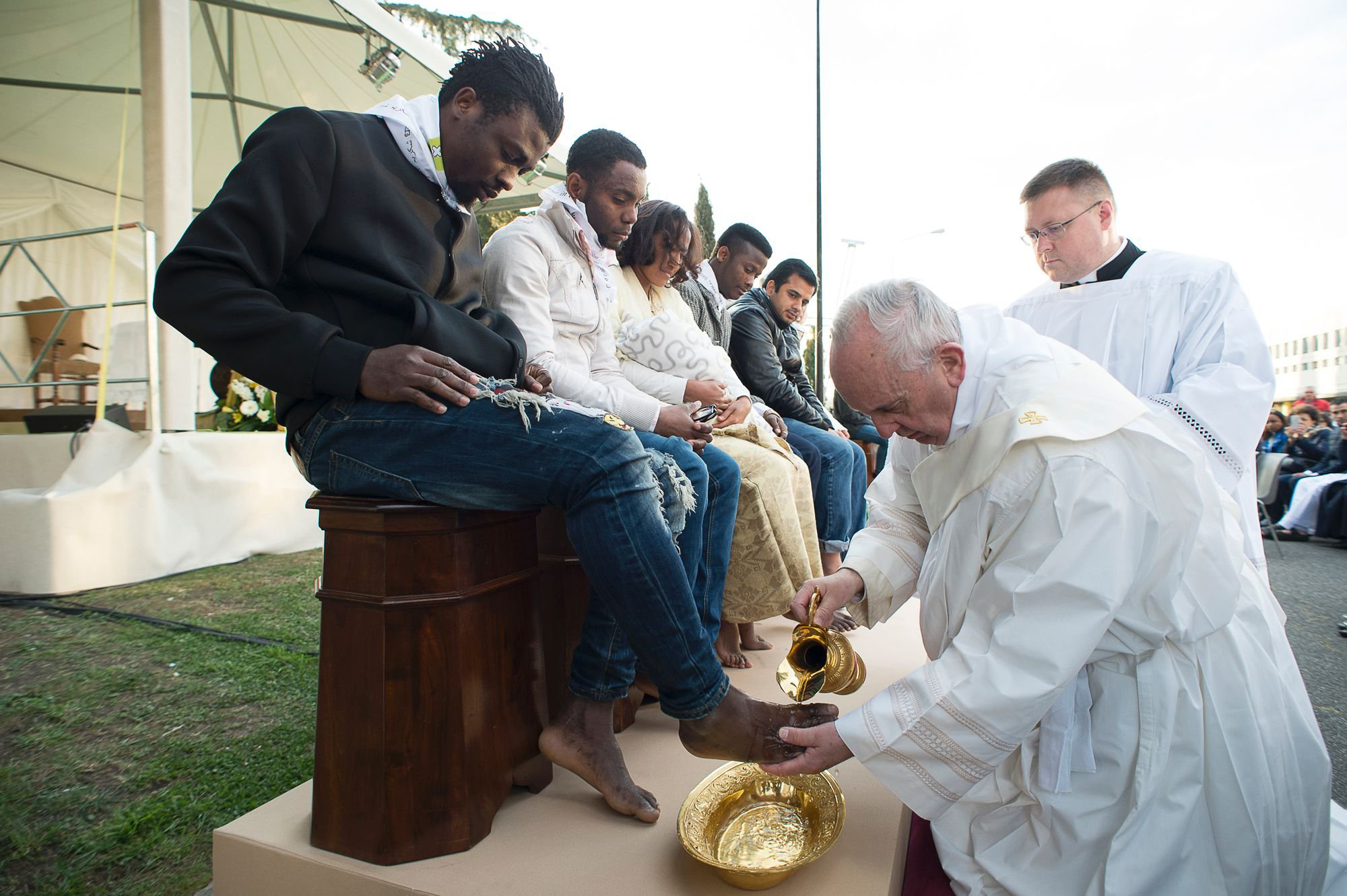
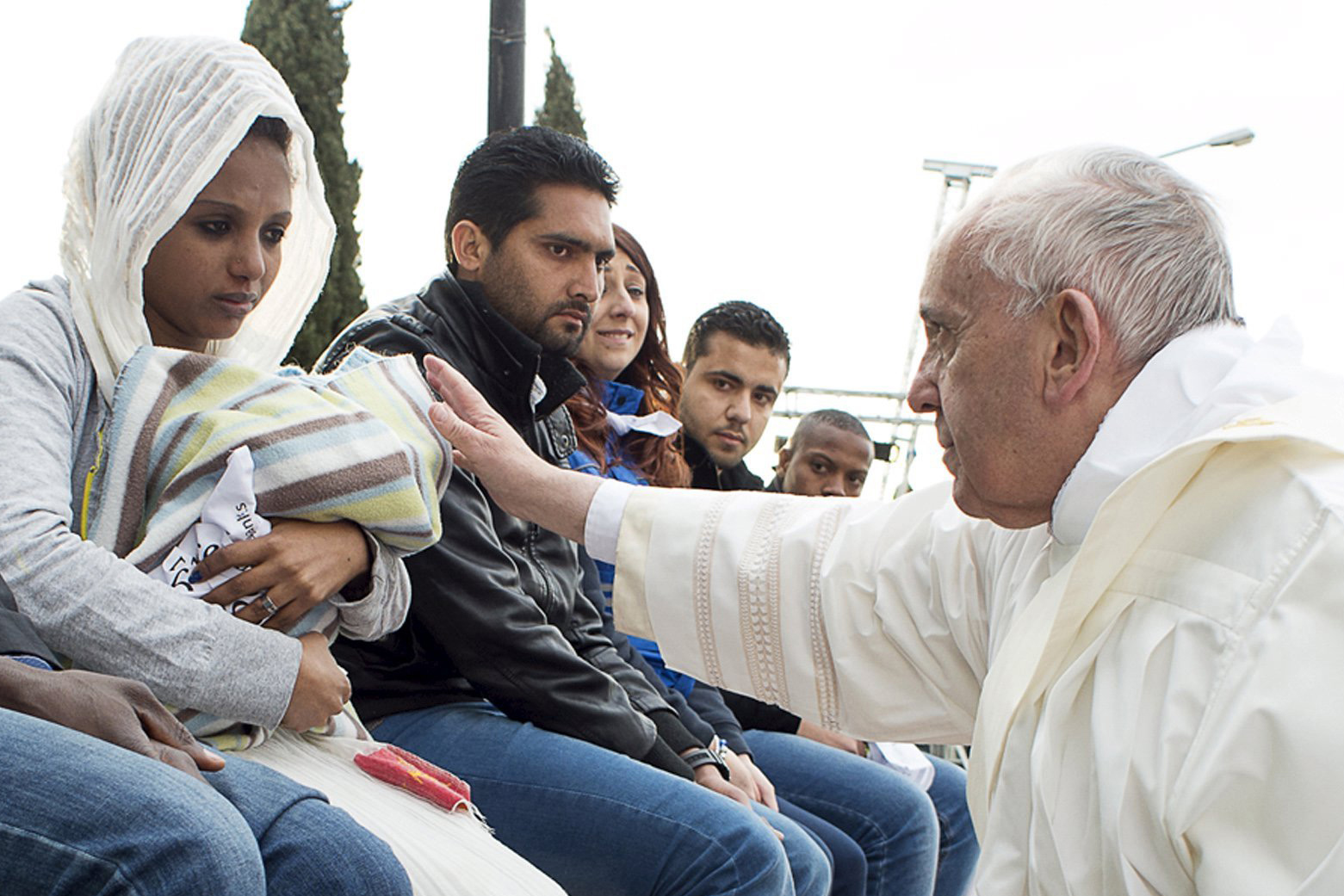
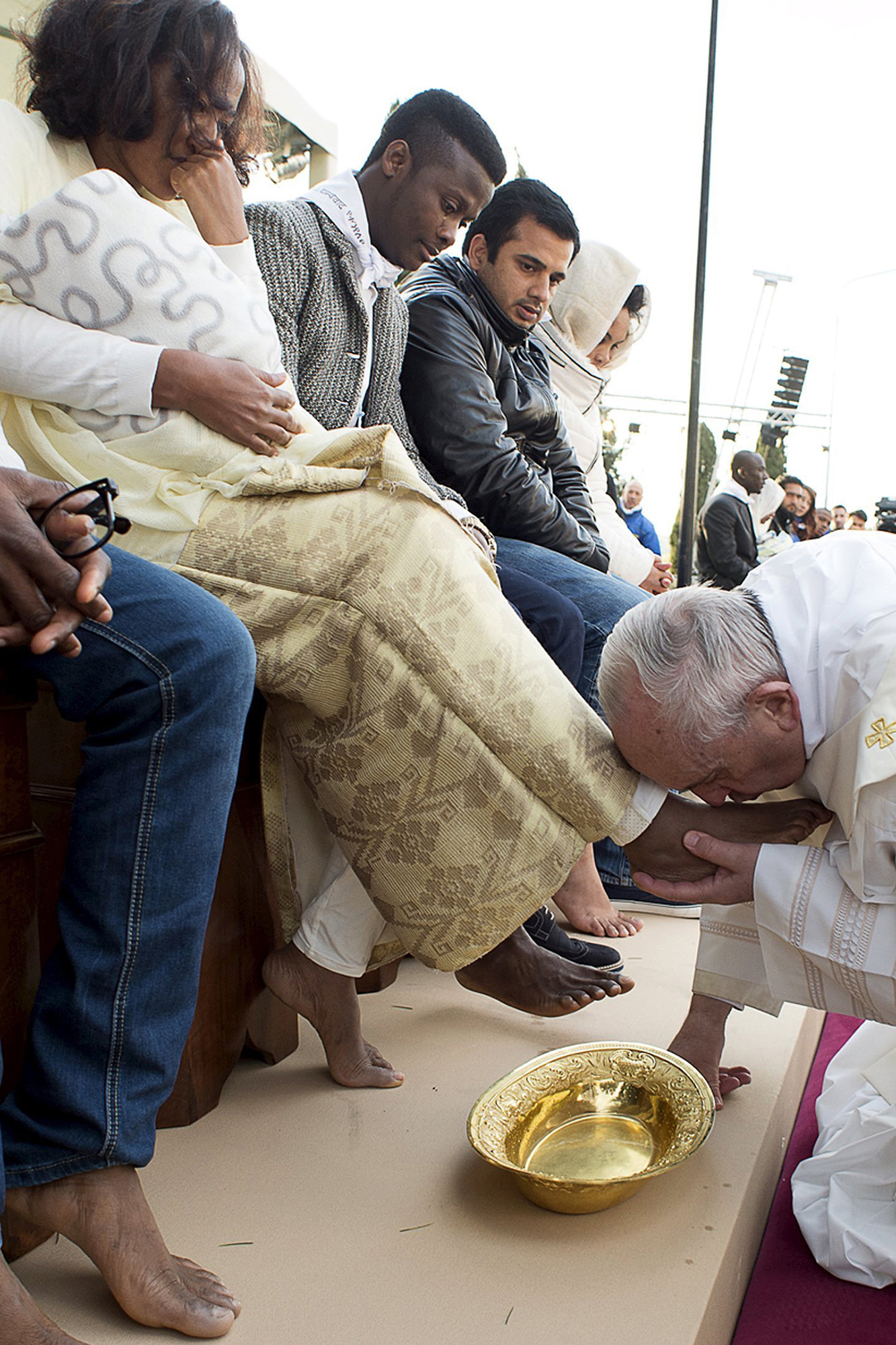
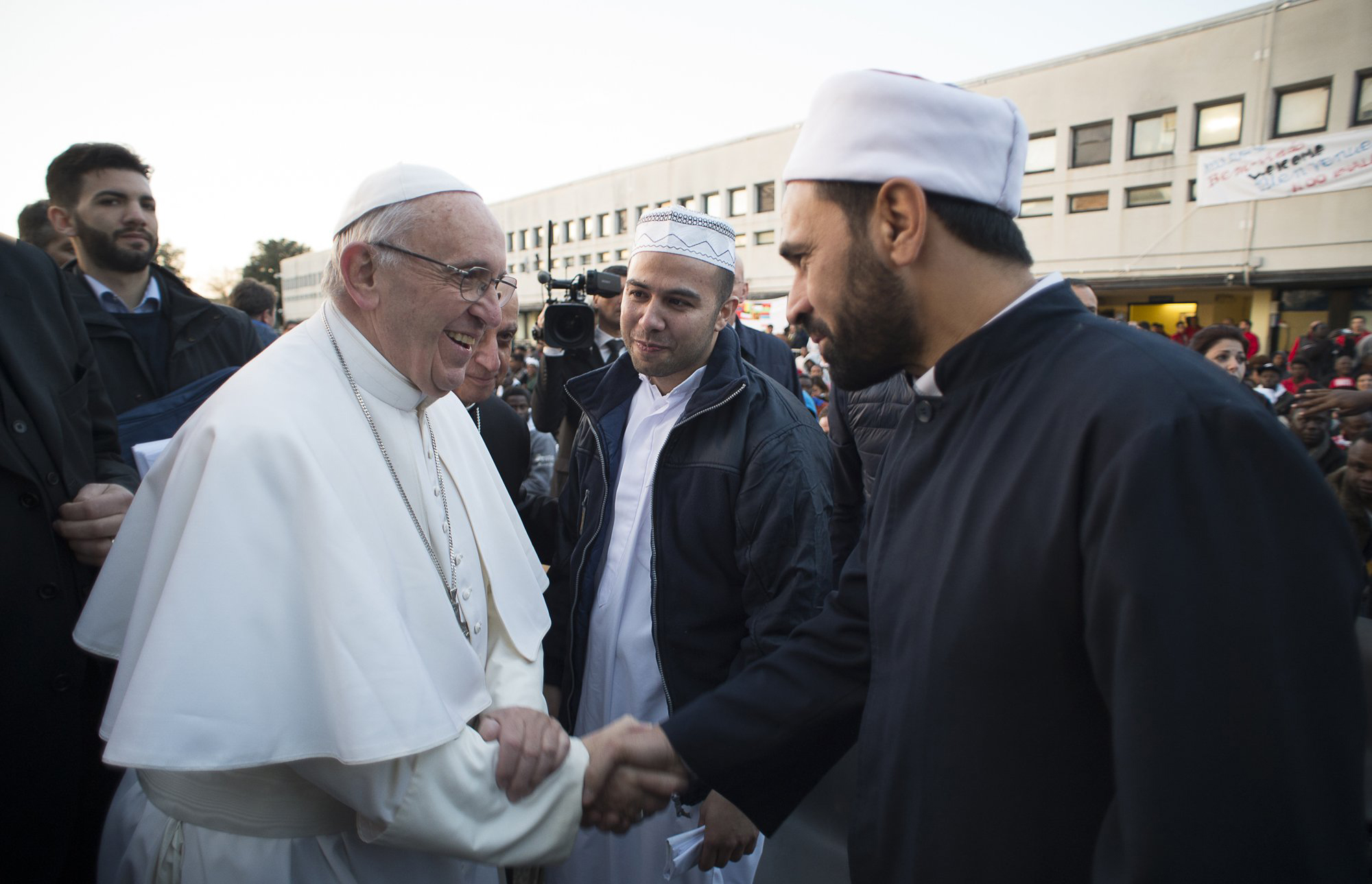
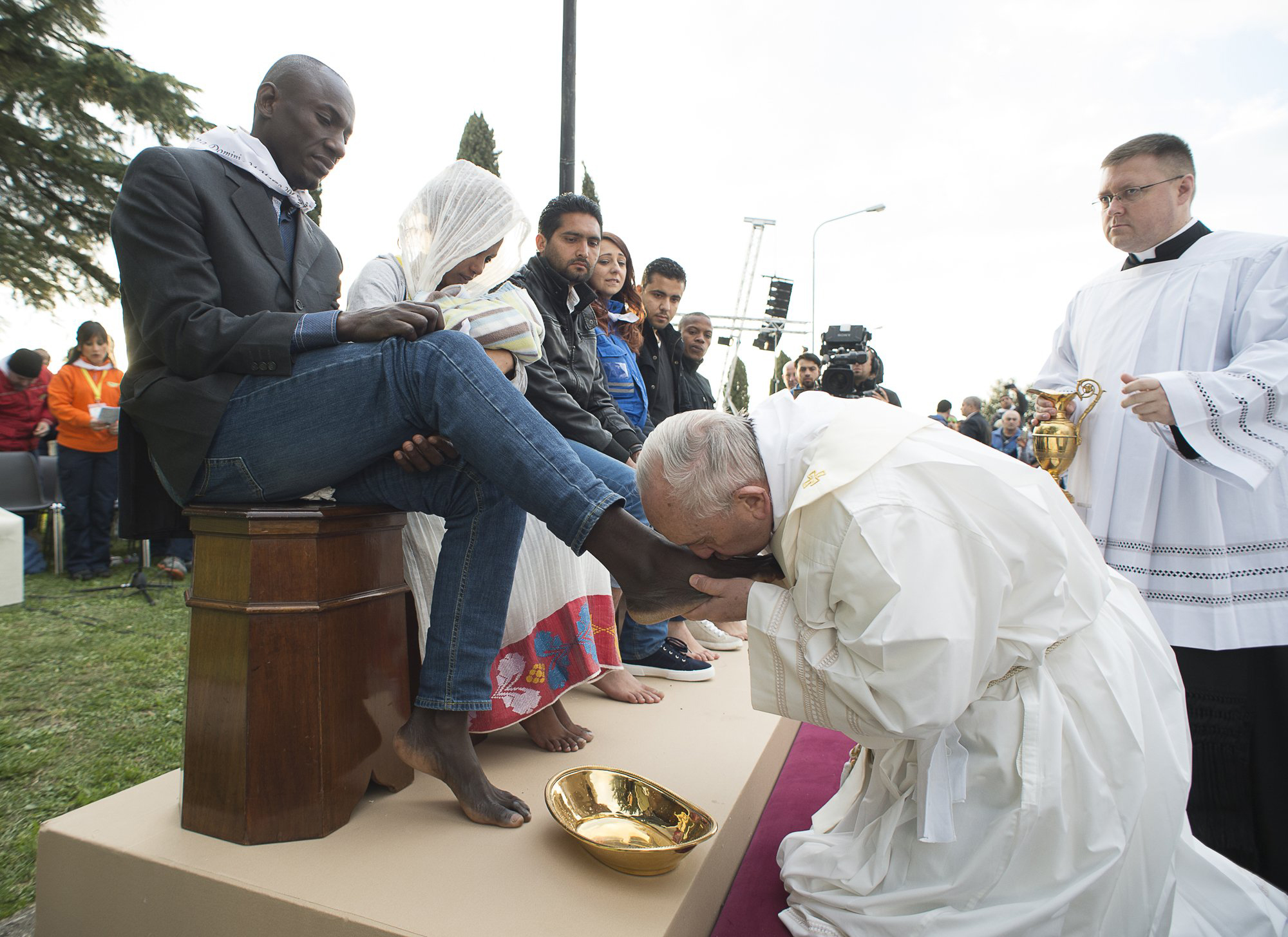
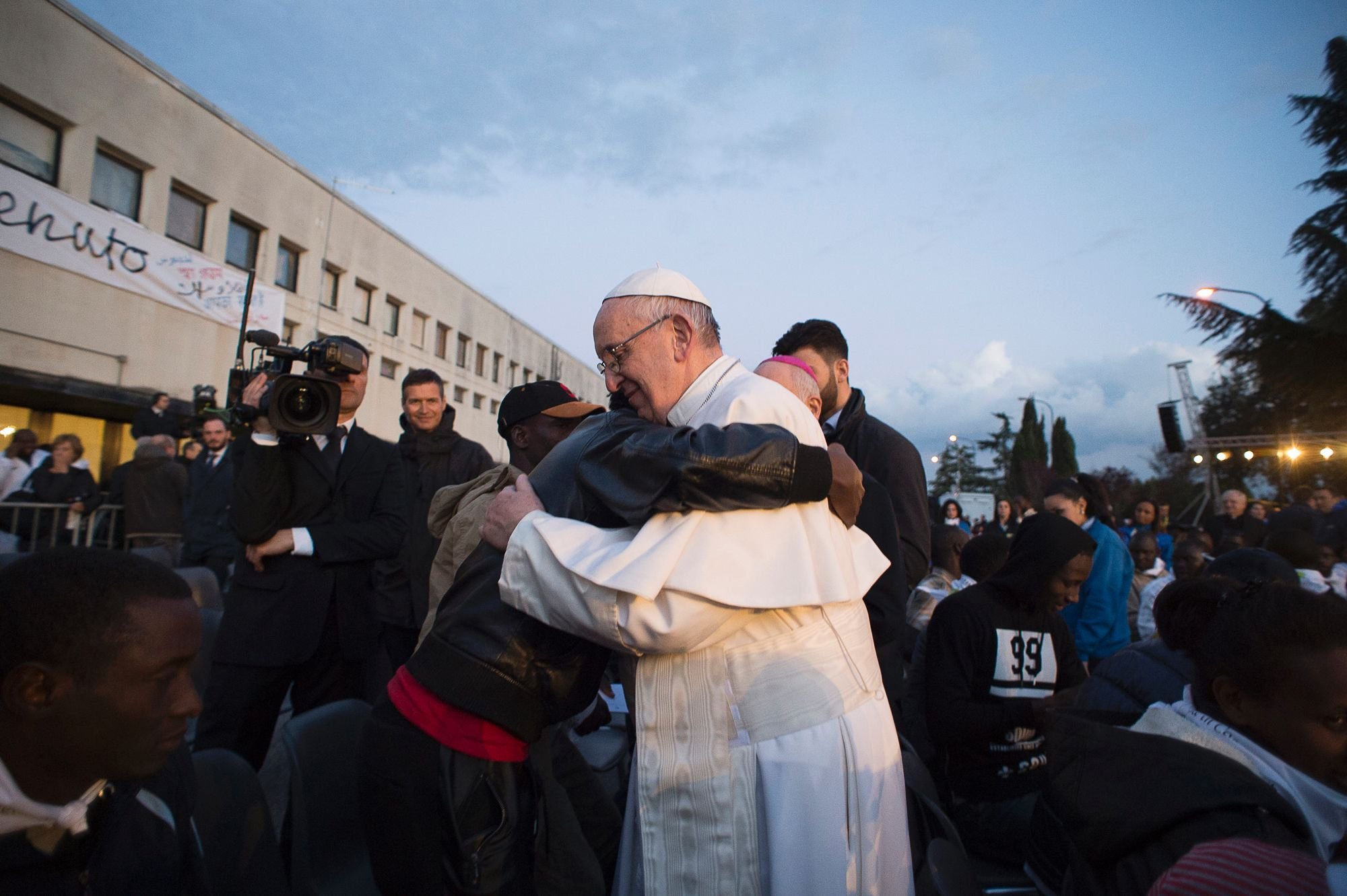
But some in the town were not so pleased with the pontiff’s arrival. Hours before the visit, municipal workers were scrubbing off graffiti which read “Papa Don’t Preach” from the walls surrounding Mytilene harbor.
Petrakis Sotirios, who runs a small car rental firm in Mytilene, was disgruntled by streets in the city being shut down for the Pope’s visit, especially on a Saturday morning that would otherwise have been busy business. “Today the Pope from Rome is here,” he said. “Next week, maybe the King of Spain. This summer, maybe the English King will come. All for the refugees. But what about the people of Lesbos?”
After leaving Mytilene, Francis drove to Moria, the detention centre where some 3,000 migrants are being kept while they wait for their asylum claims to be processed.
Days before he arrived, the centre was being quickly transformed in time for his visit, with the walls being whitewashed, a new sewer system installed, and according to people inside, migrants themselves uprooted and moved to a different part of the camp.
Once in Moria, the Pope, Bartholomew and Ieronymos shook hands with some 250 migrants, some of whom held signs reading “We Want Freedom” and “Welcome to Lesbos Pope Francis – Please Help.” Several times, the three leaders were met by women and children crying: At one point, a young man broke down in tears kneeling before the pontiff saying “Please help us, please listen.”
The religious leaders then gave speeches in front of the gathered migrants. Bartholomew and Ieronymos were open in their condemnation of the political situation that had resulted in the current crisis.
“Today we unite our voices to decry any form of depreciation of the human person,” said Ieronymos. “Only those that see the eyes of the small children we saw today in the refugee centre will be able to recognize the bankruptcy of humanity. I hope that we never again see children washing up on the shores of the aegean sea.”
“The world will be judged by the way it has treated you,” said Bartholomew. “And we will all be accountable for the way we respond to the crisis and conflict in the regions that you come from,”
Francis, however, was more reserved, offering a message of solidarity and hope but stopping short of criticizing the politics of the crisis.
“I want to tell you that you are not alone,” said the Pope, praising the efforts of Greek people and other volunteers for helping desperate migrants. “We hope that the world will heed these scenes of tragic and desperate need and respond in a way worthy of our common humanity.”
All three leaders then signed a joint declaration calling on the international community to respond with to the migrant crisis with compassion and generosity.
Though the Vatican emphasized the visit was strictly humanitarian, aid agencies on Lesbos are hoping the high profile visit will have a political impact, highlighting the human consequences of the E.U.-Turkey deal which they say has left migrants in appalling conditions in detention.
“Having such a powerful voice spotlight refugees is extraordinary,” said Boris Cheshirkov from U.N. refugee agency, UNHCR. “It reignites the dialogue on shared responsibility at a time when we are seeing an increase in xenophobia. But we need to see further engagement based on solidarity from all E.U. member states and beyond.”
“We hope the Pope’s message of solidarity will have an impact on the hearts and minds of European policy-makers,” says Jane Waite, Deputy Director of the International Rescue Committee in Greece. “Since the implementation of the EU-Turkey agreement four weeks ago, only 46 refugees have been granted passage into safe countries. As thousands are left waiting, the relocation process simply must be accelerated.”
After a brief lunch with eight migrants inside the camp, Francis and the Orthodox Leaders headed back to the port of Mytilene, where the Pope gave further remarks in front of a crowd of journalists and local residents praising the generosity of the people of Greece and reminding the world that refugees “are not just numbers. They are people, they are names, they are stories.”
Watching on eagerly was Ama Merakis, 62, who has lived on Lesbos for ten years. She had broken her arm two days ago, but said that didn’t stop her from coming to see the Pope.
“This is one of the most incredible things that’s ever happened here,” she said. “It used to be no one even knew where this island was. Then the refugees came and now everyone is talking about it. But the crisis hasn’t been addressed. Now the Pope will make leaders find a solution. They call him a force of nature. He changed the game.”
Not everyone was so positive, however. A group of protesters tried to unfurl a banner reading “Condemn the Deal” but were quickly escorted out by security. “This is not the Europe we want,” yelled one woman as she was dragged from the port area.
Outside, the scene was equally tense. A large group of protesters had gathered with signs that read “Moria is an EU Prison,” and chanting “Stop Deportations, No Borders, No Nations.” One of the protesters was Gertrude Rietveld, 64, a volunteer from Amsterdam. She said she’d been delivering food to migrants inside Moria for six months with the group Because We Carry.
When asked if she thought the Pope’s visit would help reverse the current political climate, she said “I hope so, for humanity.” Then she looked at the photo she was holding of a young migrant. “But it won’t help them. It’s much bigger than this, than me. There must be some greater force at work here, bigger than I can ever imagine.”
After offering prayers for the migrants, the Pope returned to Mytilene airport, where he was met by 12 Syrian refugees, who the Vatican confirmed would be traveling with the pontiff back to Rome. The Vatican said Francis wanted to “make a gesture of welcome” to these vulnerable migrants. The three families, including six children, had been in camps on the Lesbos since before the E.U. – Turkey deal took effect.
More Must-Reads from TIME
- Why Trump’s Message Worked on Latino Men
- What Trump’s Win Could Mean for Housing
- The 100 Must-Read Books of 2024
- Sleep Doctors Share the 1 Tip That’s Changed Their Lives
- Column: Let’s Bring Back Romance
- What It’s Like to Have Long COVID As a Kid
- FX’s Say Nothing Is the Must-Watch Political Thriller of 2024
- Merle Bombardieri Is Helping People Make the Baby Decision
Contact us at letters@time.com